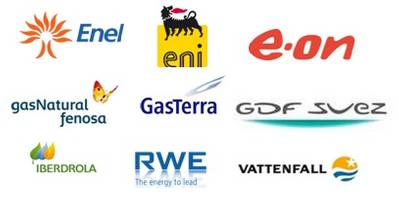Energy Companies Propose Rebuild of European Energy Policy
Following on from the formal call of May 21, 2013 to the European Council, Gérard Mestrallet CEO of GDF SUEZ and Paolo Scaroni CEO of ENI appeared before a European Parliament hearing. The event was jointly organized with Amalia Sartori (Chair of the EU Parliament’s Energy Committee) and took place in the presence of the European Commissioner for Energy, Günther Oettinger.
The hearing was aimed at highlighting the risks of the EU’s present energy policy. Indeed, the efforts made by energy companies to attract the necessary private sector investors have been hampered by the uncertainty of the return on investments, in part due to the lack of a clear, foreseeable and objective energy policy framework based on stable and predictable regulation. As a result, European industry can neither fulfill its potential as a source of growth and employment nor play a key role in establishing a dialogue with producing countries. Energy security of supply is no longer guaranteed, CO2 emissions are currently on the rise, investments in the sector are not happening and energy bills are rising sharply. Faced with this failure, the nine energy companies have seen the need to formulate concrete proposals to revitalize Europe’s energy policy now:
1. Limit soaring energy bills
European consumers (citizens and industries) must be able to pay fair prices for their energy. Energy operators are, through their investments, at the forefront of the development of renewable energy sources across Europe. However, it is now necessary to draw the lessons from recent EU policy developments (including recognizing that the rules of the game to which investors sign up, simply cannot be subject to change halfway through for short-term political reasons) so as to identify possible improvements. Therefore, the industry leaders propose:
- To ensure that the energy consumer bill reflects as far as possible the market based cost of energy and that it cannot be a vehicle for financing other policies. A well-functioning and integrated European energy market will further foster competition, empower customers and enable a cost-effective transition of the energy system;
- To foster the integration of new capacities of the most mature renewable energy technologies (taken into account, notably, the forecasts of learning curve) into the regular market process and with a view to enhancing competition;
- To adjust, for new installations, public support for renewable electricity production in view of reflecting the electricity market needs; and
- To strengthen R&D policies and funding (Horizon 2020), and support the least mature renewable electricity technologies by enhanced R&D efforts rather than by production subsidies.
2. Guarantee a reliable electricity and gas supply
European consumers must always benefit from fully reliable, uninterrupted energy supplies. To that end, the industry leaders propose:
- To revitalize the European “Electricity Coordination Group” as a strategic platform to exchange views and information between Member States as well as other stakeholders, on electricity policy, with a special emphasis on national decisions on the energy mix that may have an effect on other Member States;
- To immediately apply the third package of legislative proposals in all Member States in order to standardize rules in Europe and facilitate exchanges;
- To utilize all existing power capacity contributing to the security of supply rather than subsidizing new capacity construction that may undermine a level-playing field between competitive technologies;
- To speed up the establishment of EU guidelines for non-discriminatory capacity remuneration mechanisms;
- To implement, as soon as possible, the European program contributing to the financing of important European energy infrastructures; and
- To enhance the diversification of gas supply by routes and sources, notably, through domestic energy production (including unconventional sources), whilst always taking into account environmental concerns.
3. Reinforce Europe’s climate ambition
European consumers must be able to benefit from energy that is as respectful of the environment as possible and that supports the achievement of the other two EU objectives: competiveness and security of supply. To that end, the industry leaders propose:
- To give a new impetus and to fundamentally strengthen the European carbon market. This can be achieved by: i) measures to rebalance CO2 supply and demand in 2013-2014 and in the framework of a long term perspective of ambitious emissions reductions targets, ii) discussing and deciding as soon as possible on an ambitious but realistic greenhouse gas emission reduction target by 2030 as the main driver for a pathway towards a low-carbon economy in 2050, iii) potentially expanding the carbon market’s application to other CO2 emitting sectors in the context of an international agreement;
- To accelerate the setting up of the future climate summit planned in Paris during 2015 so that this key event can achieve a far-reaching agreement; and
- To introduce, should an international agreement not be reached, additional measures to secure the competitiveness of EU industries with a risk of carbon leakage.
These concrete proposals are also being presented to key European Heads of State or Government with a view to enhancing the prospects for the February and March 2014 European Council meetings dedicated to energy issues.











